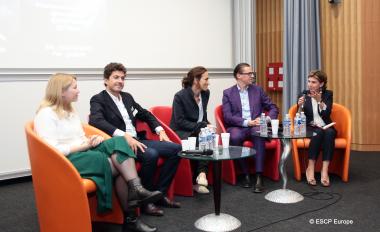Lectra: Evolution of fashion professions at heart of Lectra’s 8th education congress
Lectra brings together partnership schools and industry experts to discuss how changing professions
in fashion are impacting training programs
Lectra, the world leader in integrated technology solutions dedicated to industries using fabrics, leather,
technical textiles and composite materials, recently welcomed partners from the world of
education to the company’s Bordeaux-Cestas campus for its eighth education congress. The
event was dedicated to the mega trends shaping the fashion industry and impacting
professions from design to production.
Over fifty representatives from among the most important fashion schools in Germany, Canada, China,
USA, France, Hong Kong, Italy, The Netherlands, Poland, United Kingdom, Switzerland and Sweden, participated
in this biannual meeting between industry experts and teaching professionals.
Fashion professions are evolving as companies make their first steps towards Industry 4.0, adopting 3D
and rationalizing the lifecycle management for their collections thanks to PLM. Lectra’s congress enabled
schools to discuss the developing role of designers and patternmakers, and the new elements to be
integrated into training programs.
Lectra illustrated future changes through presentations on design, patternmaking, 3D prototyping, and PLM.
“It is fundamental to bring innovation experts in the industry together with fashion schools, because
students will drive the evolution of this industry,” stated Pascal Denizart, Managing Director of the Centre
européen des textiles innovants (CETI).
Working with schools to design courses which meet the needs of fashion companies has always been at
the heart of Lectra’s education program. During the event, the company presented collaborative
experiences between partner schools and fashion brands, such as the competitions organised by Lectra
with Missoni, Balenciaga, and Armani in Italy, as well as Peacebird in China and JC Penney in the United
States.
In the United Kingdom, Lectra collaborated with COS (H&M group) and the Arts University Bournemouth
(AUB) for a competition centred on the design of a collection with zero waste.
“The process was totally digital, from design to the creation of a virtual prototype in 3D. Our students learnt
to optimize each stage of the process. By leveraging the use of Kaledo®, Modaris® and Diamino®, the
collaborative work between AUB, COS and Lectra is exactly the type of project that enormously motivates
our students. Live briefs developed with leading fashion brands and Lectra offer excellent opportunities
which directly inform industry currency and student employability,” explained Penny Norman, a lecturer at
AUB.
The event also shone the spotlight on China and its major role in the evolution of the fashion industry.
Li Min, Vice-Dean of the fashion and design faculty at Donghua university in Shanghai spoke of the event,
organized by Lectra, which brought together major Chinese companies, experts, and representatives from
the biggest schools in China.
“Exchanges on the impact of the Made in China 2025 plan on the fashion industry can better prepare
students for tomorrow’s professions, where digital and automation will occupy a far more central position
than today,” testified Li Min.
"The fashion industry is evolving so fast that sharing insights and best practices with experts and other
fashion schools has become vital to ensure we offer the best learning experience and technology tools to
our students", said Dr. Trevor J. Little, Professor of Textile and Apparel, Technology and Management in
the College of Textiles at NC State University.
“Lectra’s eighth education congress confirms the company’s commitment to our partner schools. We
shared our analysis of the market, the digitalization of the eco-system, and how Industry 4.0 principles can
be applied to the fashion industry. We also discussed mass customization and the role of PLM. While these
are key subjects for our customers, many schools are only now approaching them. We are preparing
tomorrow, today: Lectra is supporting our customers, and schools to play an essential role,” concludes
Céline Choussy Bedouet, Chief Marketing and Communications Officer, Lectra.
© Lectra








